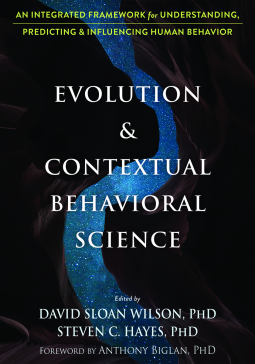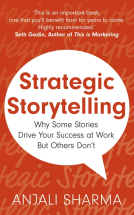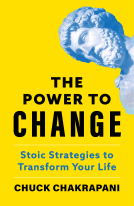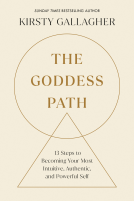
Evolution and Contextual Behavioral Science
An Integrated Framework for Understanding, Predicting, and Influencing Human Behavior
by David S Wilson; Steven C. Hayes; Anthony Biglan
This title was previously available on NetGalley and is now archived.
Send NetGalley books directly to your Kindle or Kindle app
1
To read on a Kindle or Kindle app, please add kindle@netgalley.com as an approved email address to receive files in your Amazon account. Click here for step-by-step instructions.
2
Also find your Kindle email address within your Amazon account, and enter it here.
Pub Date Oct 25 2018 | Archive Date Jan 16 2020
New Harbinger Publications, Inc. | New Harbinger
Talking about this book? Use #EvolutionAndContextualBehavioralScience #NetGalley. More hashtag tips!
Description
What do evolutionary science and contextual behavioral science have in common? Edited by David Sloan Wilson and Steven C. Hayes, this groundbreaking book offers a glimpse into the histories of these two schools of thought, and provides a sound rationale for their reintegration.
Evolutionary science (ES) provides a unifying theoretical framework for the biological sciences, and is increasingly being applied to the human-related sciences. Meanwhile, contextual behavioral science (CBS) seeks to understand the history and function of human behavior in the context of everyday life where behaviors occur, and to influence behavior in a practical sense. This volume seeks to integrate these two bodies of knowledge that have developed largely independently.
In Evolution and Contextual Behavioral Science, two renowned experts in their fields argue why ES and CBS are intrinsically linked, as well as why their reintegration-or, reunification-is essential. The main purpose of this book is to continue to move CBS under the umbrella of ES, and to help evolutionary scientists understand how working alongside contextual behavioral scientists can foster both the development of ES principles and their application to practical situations.
Rather than the sequential relationship that is typically imagined between these two schools of thought, this volume envisions a parallel relationship between ES and CBS, where science can best influence positive change in the real world.
Advance Praise
“The best ideas seem simple
and obvious in retrospect. What, for example, could be simpler or more obvious
than the principle of ‘selection by consequences?’And yet, when Darwin applied
this ‘simple and obvious’ principle to phenotypic variation, we got natural selection,
biology’s biggest idea. Then, about one hundred years later, Skinner applied
the same principle and gave us behavior analysis; a view of learning (among
other things) that still has no serious explanatory rival in psychology. With
this volume, David Sloan Wilson and Steven Hayes have assembled chapters by
some of the most creative and rigorous minds in their respective disciplines.
Their collective efforts offer an updated and elaborated account of these two
big ideas, making clear along the way what only now—in retrospect—seems so
simple and obvious: that Evolution and Contextual Behavioral Science are
scientific sprouts off the same conceptual root.”
—James Coan, PhD, professor at the
University of Virginia
“This is a remarkable and unique volume that will likely start a paradigm shift in the behavioral sciences. Edited by the foremost leaders in their respective fields, David Sloan Wilson and Steven C. Hayes assembled a fascinating collection of chapters to derive a framework for understanding and changing human behavior. If Skinner and Darwin had been asked to write a book together after further developing their ideas, this would have been the one. Evolution and Contextual Behavioral Science will change the way you think about humans.”
—Stefan G. Hofmann, PhD, professor in the department of psychological and brain sciences at Boston University
“The human mind
is different from all other animals because of our cognitive abilities. It has
given rise to extraordinary cultures both good and bad, to cooperation,
language, art, science, and medicine but also war, slavery, factory farming,
and the enjoyment of violence. The key to understanding how the human mind
works requires an understanding of its evolved functional motives and
competencies, and their contextual phenotypic organization. What nature
prepares us with, our social niche grows, patterns, and choreographs. This
volume brings together two of the world’s outstanding and leading exponents on
both dimensions, the evolved nature of mind and the contextual choreographies
of mind, partly but not only through language. Together this range of
contributors provide a fascinating and scholarly set of writings with the focus
to integrate and cross-fertilize these two bodies of scientific investigation.
Together they take a deep dive into the link between nature and culture. It’s a
must-read for anybody interested in this fundamental analysis of the human
condition.”
— Paul Gilbert, OBE, PhD,
is professor in the department of psychology at the University of Derby, and
author of Human Nature and Suffering and The Compassionate Mind
Available Editions
| EDITION | Other Format |
| ISBN | 9781626259133 |
| PRICE | £29.99 (GBP) |
| PAGES | 344 |
Links
Readers who liked this book also liked:
Silvia Moreno-Garcia
Historical Fiction, Literary Fiction, Sci Fi & Fantasy


















